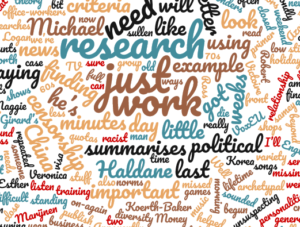Hi all,
So, in the two weeks since the last links, the news has uncovered a resurrection, multiple (simultaneous) personalities and the biggest brain-freeze in history (if the Cavs lose a close series, I will never forgive JR Smith for wasting this Thanos-level LeBronnery). If it weren’t for the inevitable and reassuring England batting collapse in the first test, I might have thought the universe was warning me about neglecting the links. Still, it meant I got to go to the Farne Isles and watch unsuspecting day trippers get dive-bombed by the Arctic Terns, so it was worth missing a week…
- He’s not facing stiff competition, but there’s a case to make that among English economists, Andy Haldane is Elvis (by which I mean less that he’s liable to die on the toilet and more that he’s got charisma to spare and can command a room with his voice). Last year, Haldane called for ‘a little more conversation’, arguing that Central Banks need to be more vocal and accessible, explaining their decisions better, and using narratives more effectively to retain credibility. So I found this quite interesting: A Supreme Court judge and Central Banker from Norway team up to analyse whether the minutes of various central banks and courts satisfy their criteria for openness, clarity and functionality. I’m not sold on their criteria, or that the minutes are the right place to look, but this is part of an important trend: thinking more about communication and the transmission of beliefs and analysis.
- I don’t need to remind anyone who reads this how much I love Michael Clemens’ work. This blog for CGD about what the revamp of the US farm work visa system should look like is both excellent in itself, but also an example of Michael using his profound academic expertise and knowledge to generate concrete and practicable policy proposals. He’s speaking at DFID in a couple of weeks and it goes without saying that it’s a seminar to block the diary out for.
- Okay, so the trade wars have begun, the standoff with North Korea is more on-again off-again than [searches for any TV relationship other than Ross and Rachel] Veronica and Logan… so what better time for a primer in the theory of repeated games with Robert Axelrod. And it being Planet Money, it’s a pleasure to listen to/read.
- Apparently, Starbucks closed all its shops for a half day on Tuesday morning to do ‘diversity training’, an activity that often amounts to little more than someone standing in front of a group full of sullen office-workers finding ways of saying “don’t be racist”. Maggie Koerth-Baker at 538 wonders if they missed all the research that shows this stuff just doesn’t work. What does? Well, we’re not really sure: a VoxEU write-up of Victoire Girard’s research on political quotas and caste discrimination in India finds effects, but ones that do not last beyond the lifetime of the quota.
- Duncan Green summarises an extreme, but archetypal example of a bad business environment, from research by Esther Marijnen.
- Two very different pieces on what makes political systems ‘work’. First, Julia Azari from 538 summarises her research on what ‘norms’ actually are, why they’re not always difficult to violate, and the importance of values. Secondly, an amazing experiment from China, in which researchers from Stanford helped some students bypass internet censorship – finding that low demand for uncensored news is just as important as censorship. Presumably, these authors will not be planning any holidays to China after they publish this…
- Am I just an old man, or does all music sound the same now? The Pudding gets into the numbers, but I’ll be honest, you need to read this just for the Snoop gif – pure genius. Maybe songs in the 60s and 70s were a bit samey. But when they sounded like this, who needs variety?
Have a great weekend, everyone!
R

